BMC brief history
1885 established
the first in US fellowships graduate study for women
1912 the first in US PhD for women
1922 cooperated programs with HF, SM and U-Pen <men in BM>
1931 Graduate School of Arts and Sciences accept male students
1980 HF became co-ed college (BM discussed it too but stayed as women college)
2015 accept transgender women and intersex individuals identify as women
Women in BM
<History of Establishment>
1877 Joseph Wright Taylor “wanted to make a Quaker college for women/female Haverford”
1855 BMC established--blend of good points of other colleges/unis (as it was built after many other colleges/unis)
policy: adequate prepared students/traditional liberal arts course/do not treat women as men
2nd President Martha Carely Thomas wanted to make --female community/beautiful campus “behold they are women”
“BMC is different from other women college”--to show that women could compete with Harvard men/highest standards of university training (young male faculty, graduate school, modeled on Havard exam)/not home, domesticity (no domestic work during the four years)/special uniform like male college students/students were provided with at least single room
Thomas wanted to attract wealthy daughters but needs to become a place for all women came up
References
https://www.brynmawr.edu/about/history
Horowitz, Helen. "A Certain Style of Quaker Lady Dress" and "Behold They Are Women!" Alma Mater: Design and Experience in the Women's Colleges from Their Nineteenth-Century Beginnings to the 1930s. University of Massachusetts Press, 1985. Print.
<Students voice in 1960s-1970s>
3 excerpts represented their main voice
“… You had to live up to that intellectual image and live down the negative aspects of the image. In other words, you must be clever and bright, but not intellectually aggressive or dully bookwormish: you must be knowledgeable, but not studious: you must be serious, but attractive, seductive, etc. –Class of 1964”
“… but the most rewarding part of Bryn Mawr was learning to love and trust a few women friends who, in spite of all the shit and turned us against each other all the time, were able to get together and support each other through all the bad times and share some of those happiness and growing of the good times. –Class of 1967 ”
“Haverford was a more interesting place to be for several reasons … men had more freedom, so we could come and go as we pleased there until we had to be back at two o’clock … Bryn Mawr was always silent and still … Haverford was a better place to be because we would be with men and escape the oppressiveness of an all-female environment… --Class of 1968”
BMC was established to prove that women could take on the same intellectual work as men
--excellent academic reputation (Official rhetoric of BMC=A firm commitment to feminism)
--However, in 1960s-1970s, it became “pseudo intellectualism”
Reference
Schneider, Liz. "Our Failures Only Marry: Bryn Mawr College and the Failure of Feminism” Gornick ed. Woman in Sexist Society: Studies in Power and Powerlessness. Basic Books, 1971. Print.
<Now in 2015>
interviews with current students who identify themselves as women
1 Why did you chose a women college?
“chose BMC not as a women college but for financial aids/ good academic environment/ small campus/ traditions/ close relationship between students and faculties/ rich resources/ uniqueness” “because I grew up in a women environment”
2 How do you feel being in BM as a women college now?
good points
“it is good to be surrounded by open-minded women” “safe” “supportive” “can speak out more in BM than classes in Haveford” “empowered” “confident” “learn a lot from feminists in school” “I realized everyone has potential” “never a automatic consumption like Men can do it better Men are the stronger race here” “can discuss intense issue”
negative points
“personally socially awkward to interact with men outside school” “don’t have much opportunity to communicate with men but in future I can (so it’s not so much a problem)” “desperation want to have boyfriend for some people” “sometimes overwhelming …trying to think of right words to say … some people don’t identify themselves as women … sometimes I mistake” “voicing out is sometimes too much for me … I used to sometimes stay quiet” “sometimes have issue with guys which I had never in high school(co-ed)”
other
“I feel women college is just like any other college (which are) co-ed”
3 How do you feel about men in BM?
“it is good because the value stays same but at the same time (we can) meet others” “I don’t see differences between men and women here” “It is a communication between two colleges, no matter of gender” “Fine but if the president of college was male, I think it won’t go well” “part of being a women college is knowing how to interact with men” “appreciate men coming here”
4 Do you think BM is still a women college?
yes
“BMC maintains to be a women college … seems to carry on this goal” “pay attention to women education”
I don’t know
“safe place for LGBT not even for students who identify themselves as men” “share same value … fight for minority groups rights”
no?
“in past it was … now it’s becoming contemporary/modern” “accepting transgender, have different gender, I even don’t know all of them gender” “not really women college---maybe “gender inclusive college”? … but how do parents or someone who have old-fashioned notion?” “it’s not a traditional women college anymore”
-------------------------------------------------------------------------------------
Part II: And Men?
Within the context of a historically-homogenous space, what is the role of men? How have men functioned within the space?
Part III: Transgenderism at BMC
1.) How does transgenderism affect the gender dynamic at BMC?
SURVEY:
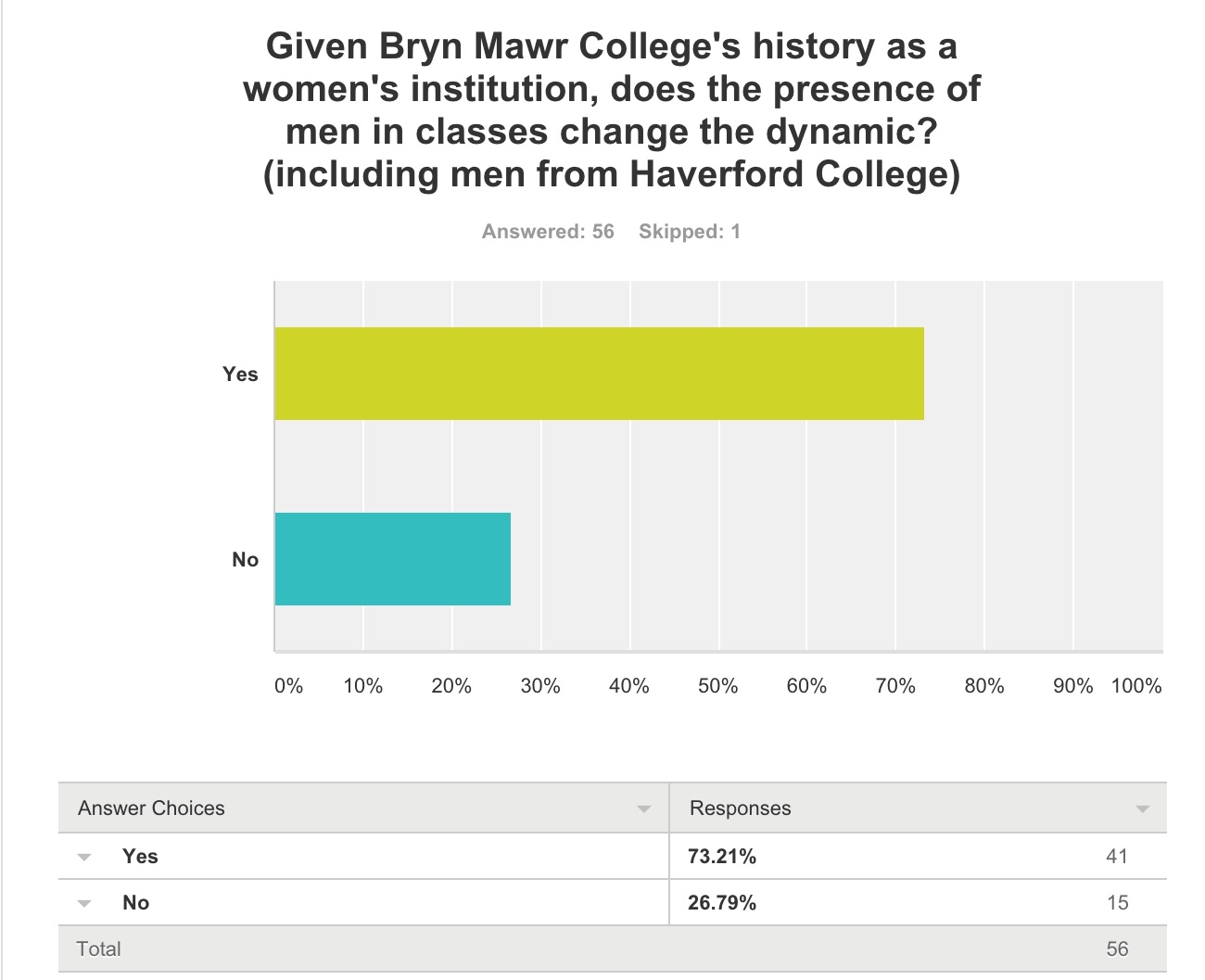
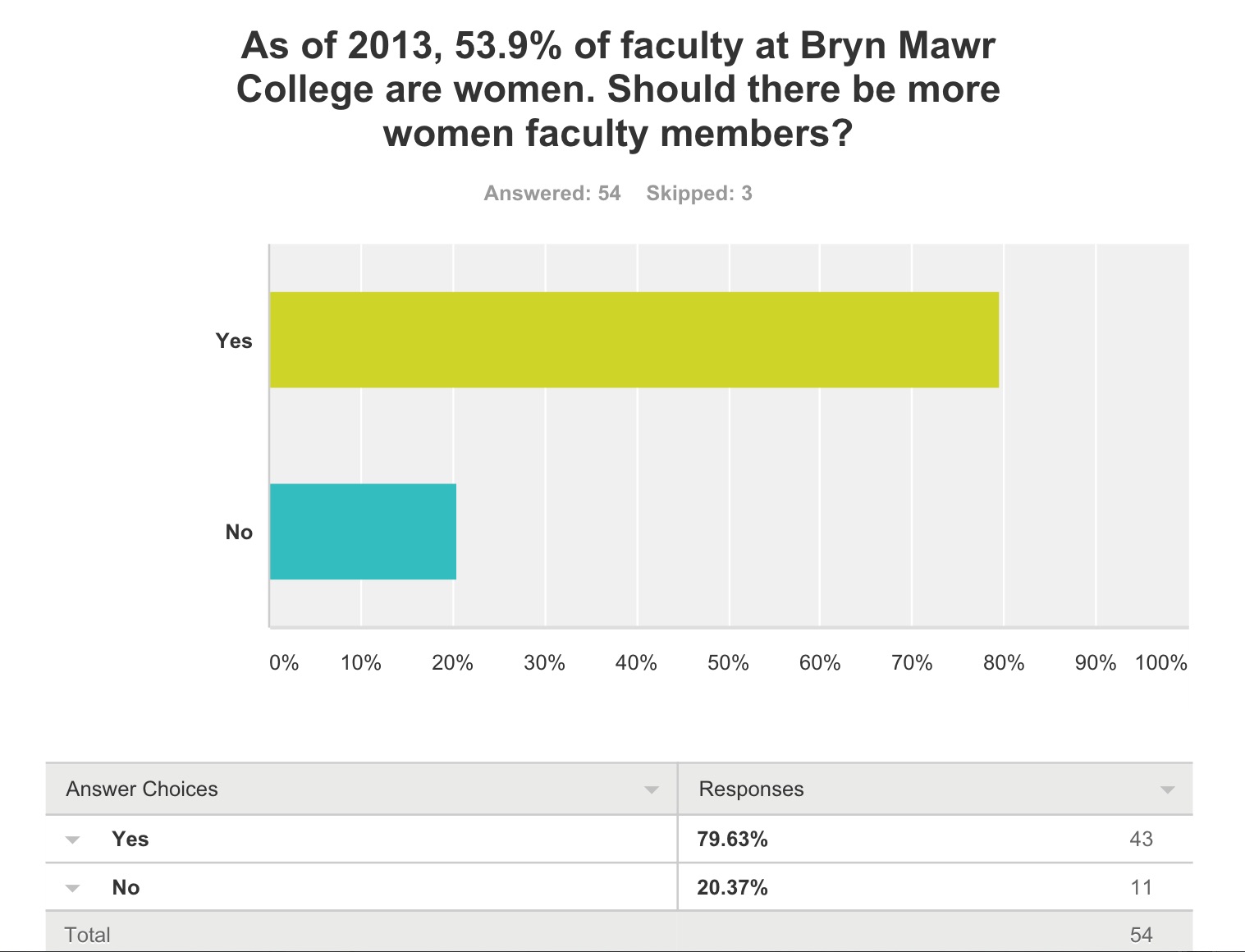
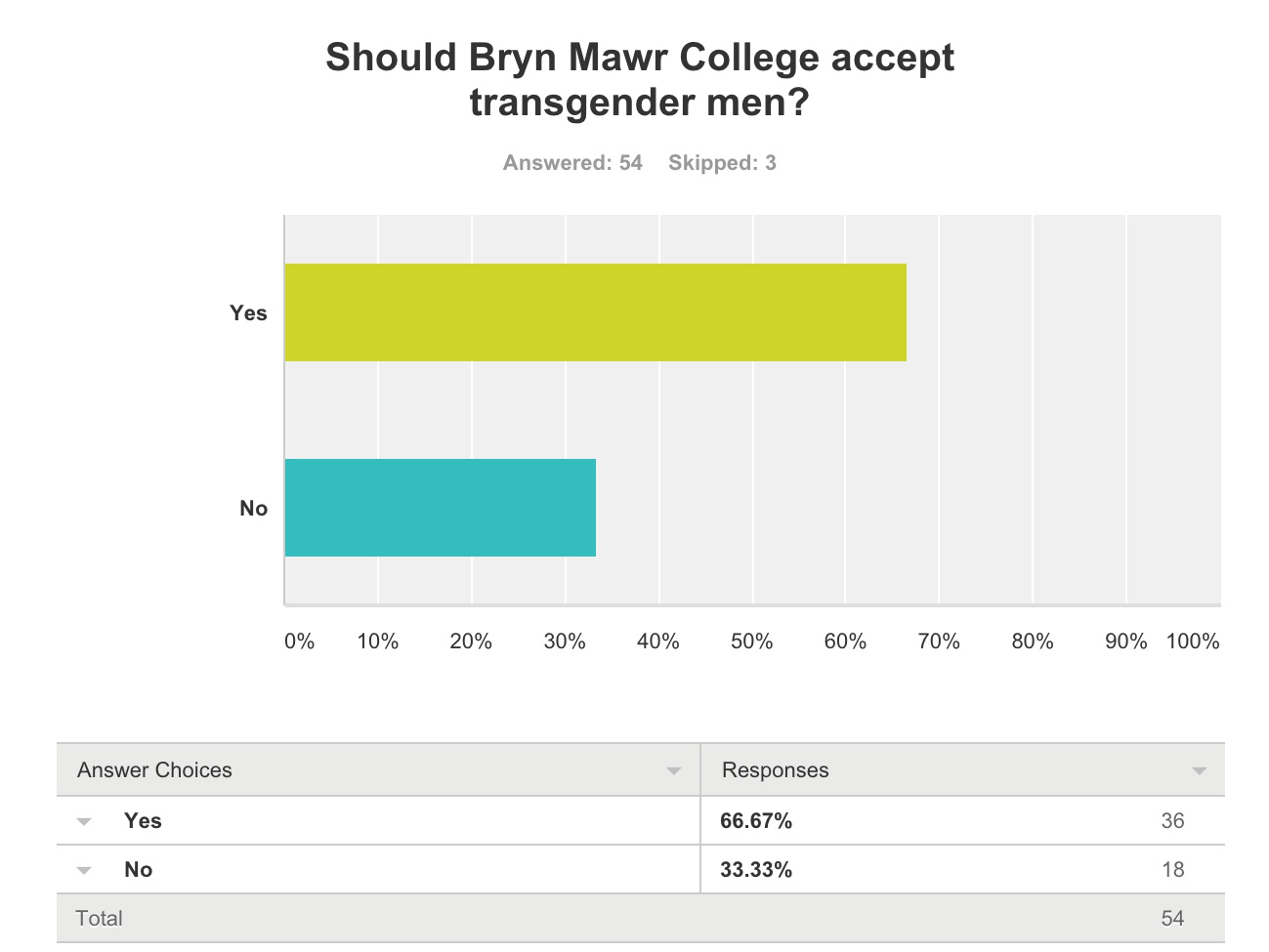
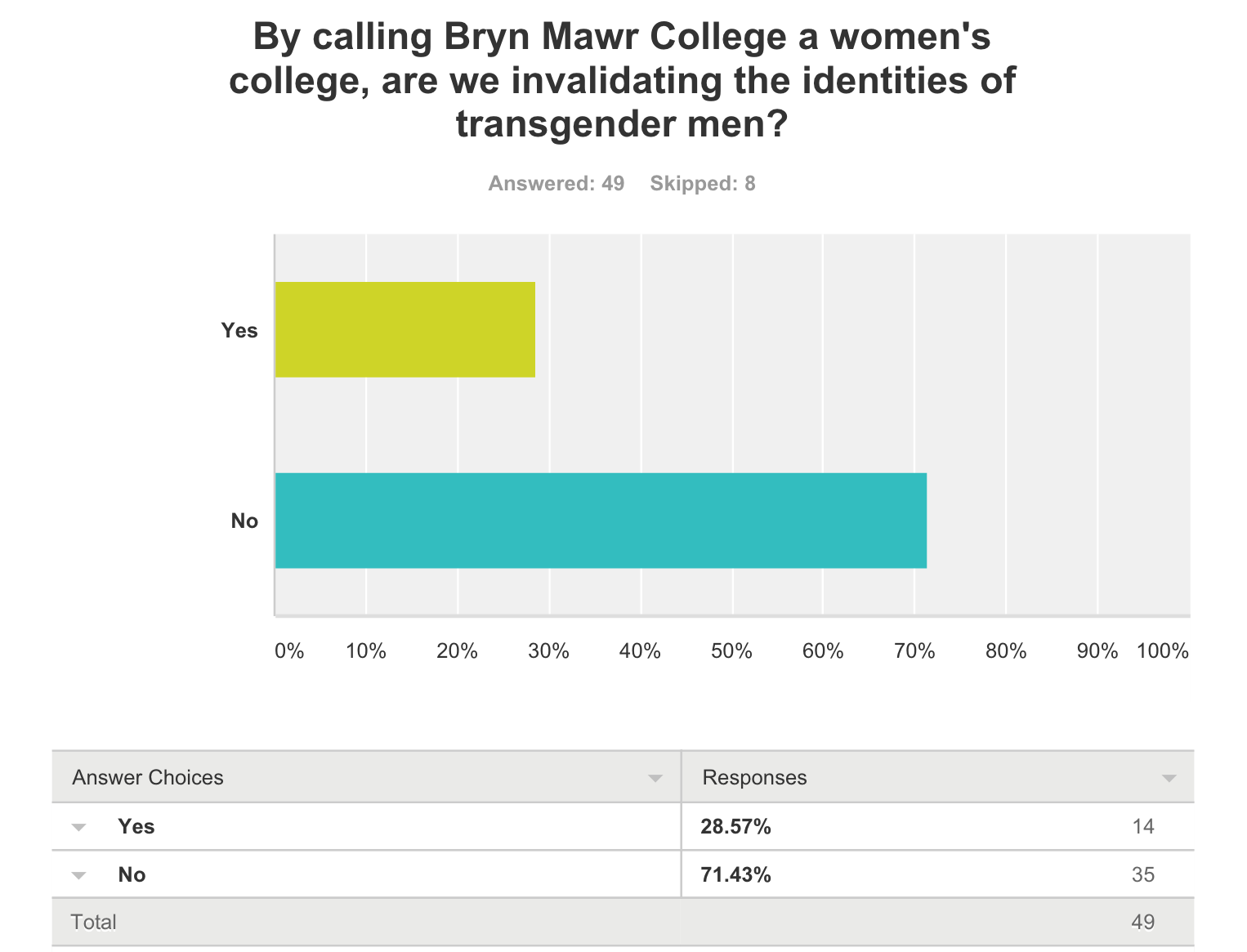
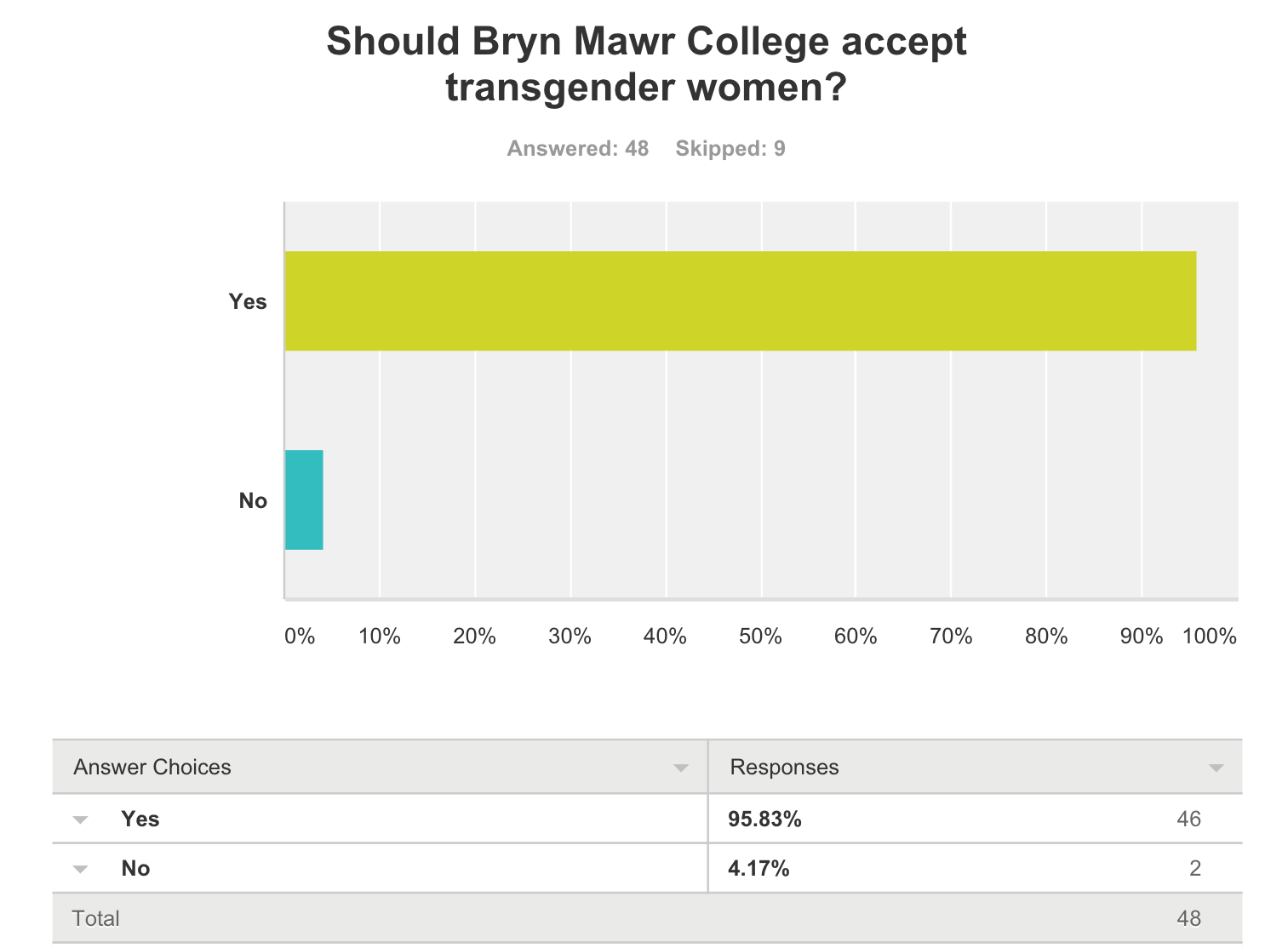
INTERVIEWS:
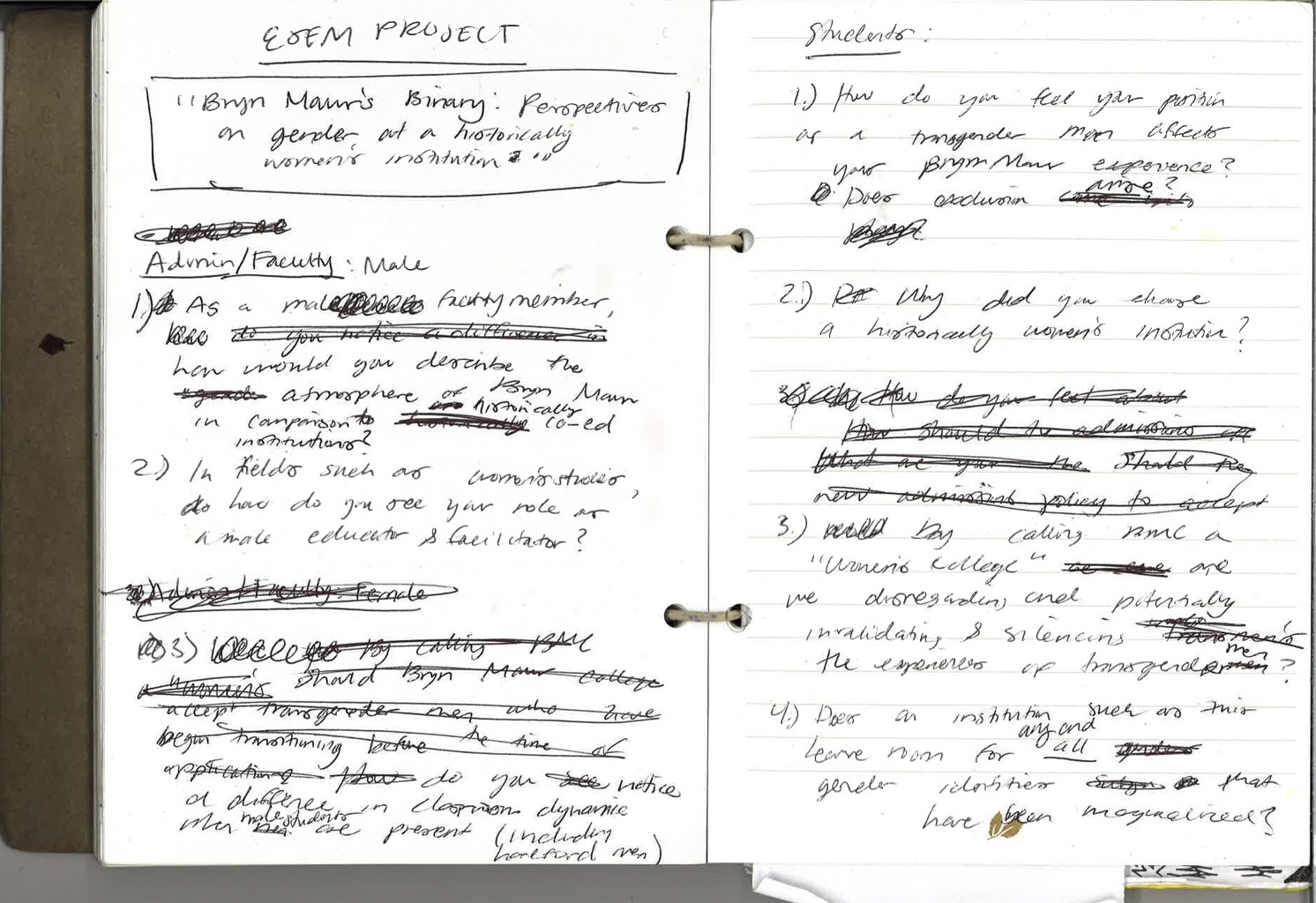
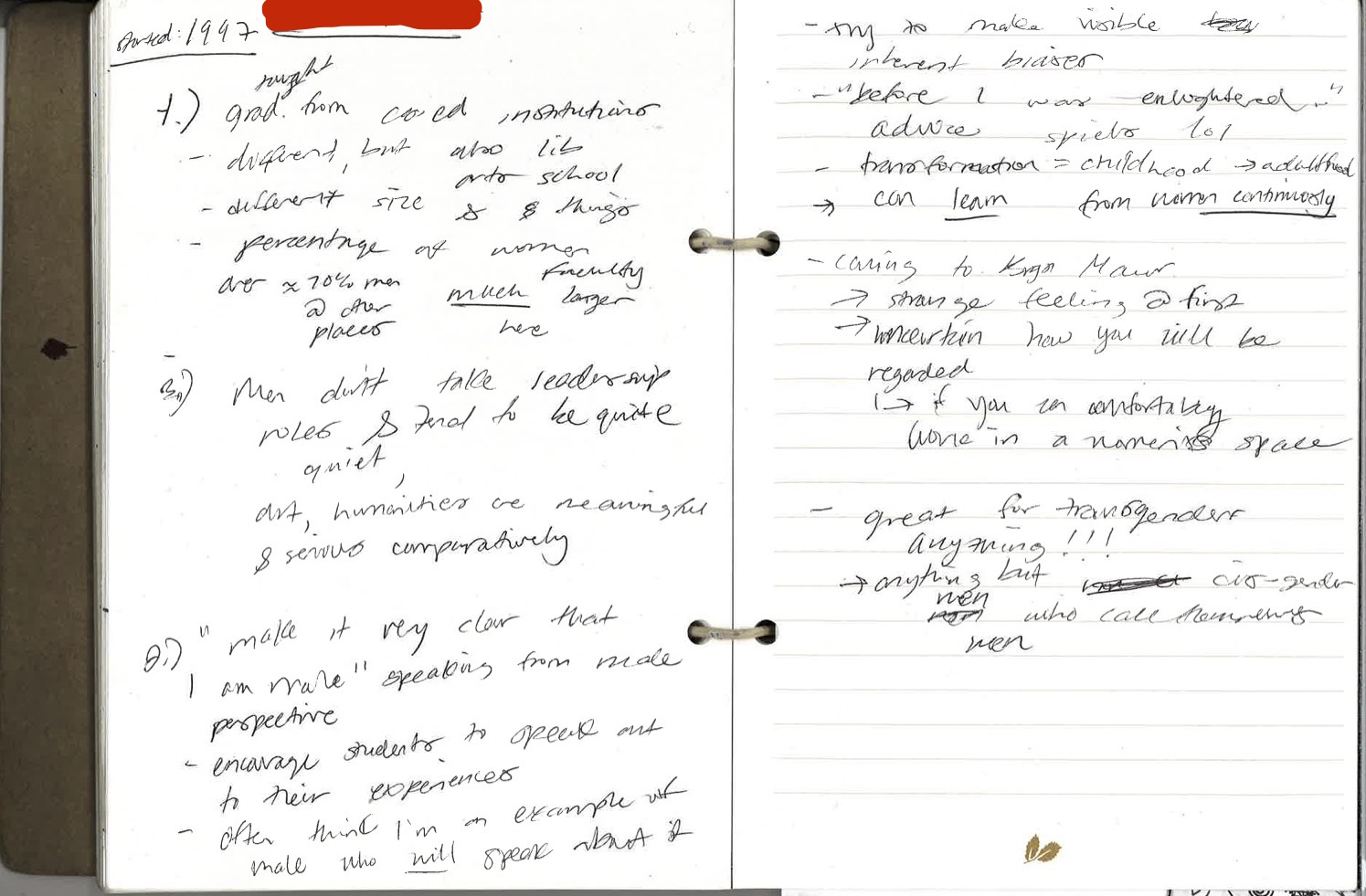
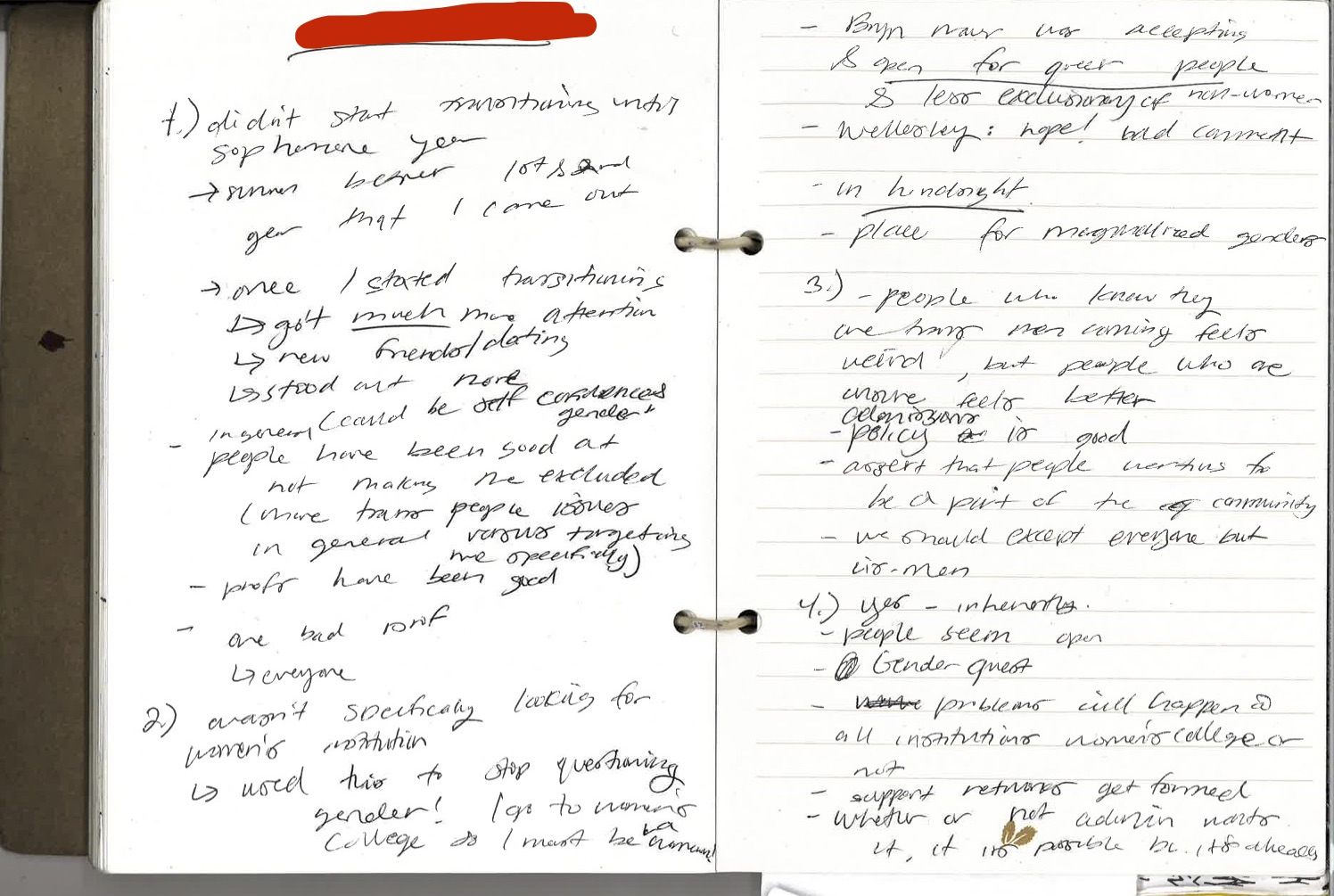
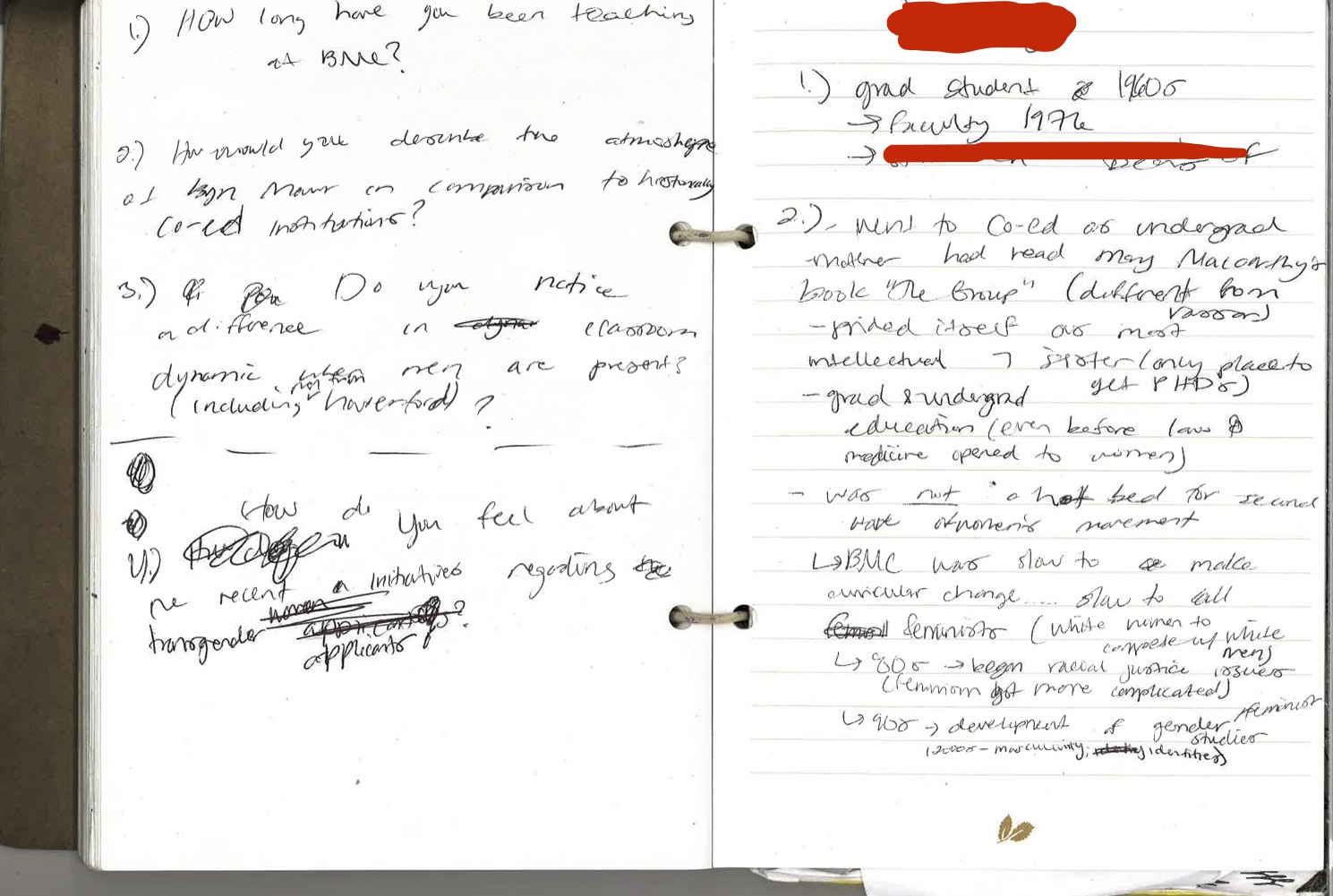
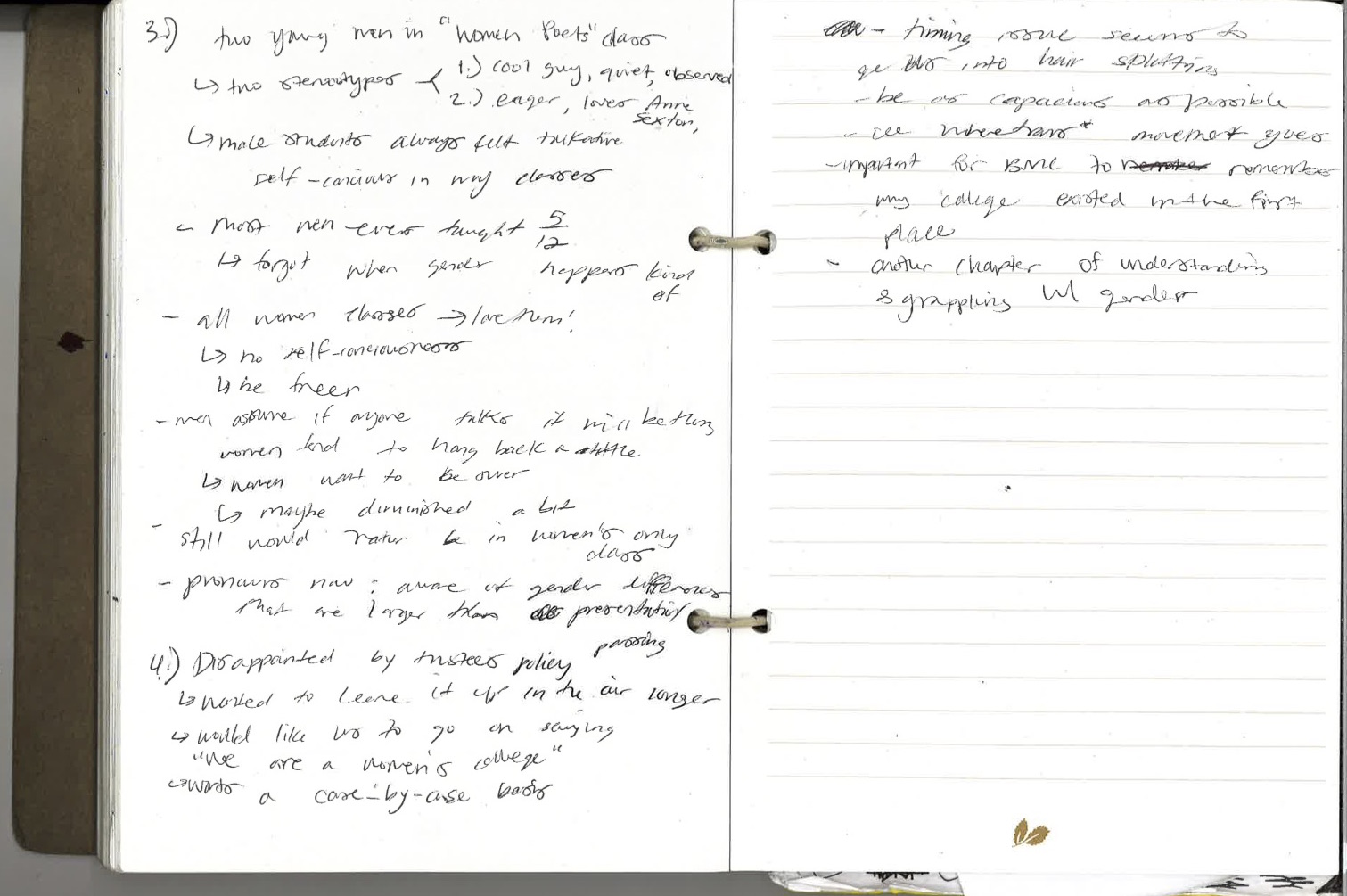
Interview with current student in BM
1 How do you identify within or outside of the gender spectrum?
“I do not identify as male or female I am still identifying now … I currently identify as gender queer”
2 How does your position as such affect your Bryn Mawr experience? Does exclusion ever arise?
“No, I think BM is gender queer friendly … there are lots of gender neutral restrooms, I can go to restroom without any worry” “BM is a bubble, make you feel great, make you feel proud to be non gender confirming person”
3 Why did you choose a historically women's college?
“women’s college provide safe environment for queer people generally better than co-ed college” “study of gender sexuality is valued more in women’s college than co-ed college”
4 By calling Bryn Mawr College a women's college, are we potentially silencing the experiences of other gender identities?
“maybe yes because there are some people who identify themselves as male in BM” “but … I like women’s college, I like the feminism value that is embodied in this name ‘women’s college’” “and it’s hard to change the name … we’re only admitting people who have physically women”
5 Does an institution such as this leave room for any and all gender identities that have been marginalized?
“there are lots of gender identities marginalized … But we have transgender admitting policy in BM now, I think it is really reasonable … I think BM is trying its best to accommodate all the identities.”
